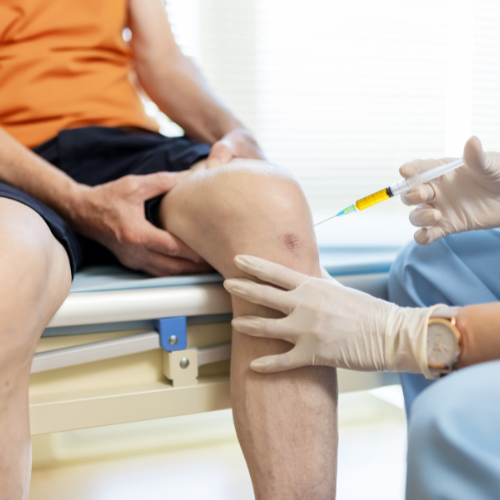Introduction
Knee arthritis is a prevalent condition affecting millions of individuals, particularly those over the age of 45. As a physiotherapist, understanding the various medical treatments available can help you understand what options are available to you. Empowering you to take control of your health and have better more informed conversations. Leading to better knee function and less pain. In this blog, we’ll delve into the various medical treatments for knee arthritis, referencing UK-based research and the National Institute for Health and Care Excellence (NICE) guidelines.
Understanding Knee Arthritis
Knee arthritis primarily manifests as osteoarthritis (OA) or rheumatoid arthritis (RA). OA is a degenerative joint disease characterised by the breakdown of cartilage, whereas RA is an autoimmune condition causing inflammation of the joint lining. Not sure if you have OA or RA? – take a look at this blog.
Medications
Medications play a critical role in managing knee arthritis symptoms. Here are the primary categories:
Analgesics:
- Paracetamol: Often recommended as the first-line treatment for mild to moderate pain. According to NICE guidelines, paracetamol should be considered before NSAIDs due to its favourable safety profile.
Nonsteroidal Anti-Inflammatory Drugs (NSAIDs):
- Ibuprofen and Naproxen: Commonly prescribed for their anti-inflammatory and pain-relieving properties. NICE guidelines suggest using the lowest effective dose for the shortest duration to minimise side effects.
- Topical NSAIDs: Preferred over oral NSAIDs for some patients to reduce systemic exposure and potential side effects.
Corticosteroids:
- Intra-articular Injections: These are often used for acute flare-ups of knee arthritis. NICE recommends considering corticosteroid injections when other treatments have not provided adequate relief. The effects can last several weeks to months but should not be used frequently due to potential joint damage.

Injections
Hyaluronic Acid Injections:
- Known as viscosupplementation, hyaluronic acid injections aim to improve the lubricating properties of the synovial fluid in the knee. Research from the UK shows mixed results, with some patients experiencing relief while others see no significant benefit. NICE currently does not recommend hyaluronic acid injections for knee osteoarthritis due to insufficient evidence of their efficacy.
Platelet-Rich Plasma (PRP) Therapy:
- PRP therapy involves injecting a concentration of the patient’s own platelets into the knee joint to promote healing. Emerging UK-based research indicates potential benefits, but NICE advises that more robust evidence is needed before routine use can be recommended.
Stem Cell Therapy:
- This experimental treatment involves injecting stem cells to regenerate damaged cartilage. While promising results have been reported, NICE currently considers stem cell therapy to be investigational, pending further clinical trials and evidence.
Surgeries
For patients who do not respond to physiotherapy, medications or injections, surgical options may be considered:
Arthroscopy:
- This minimally invasive surgery involves using a small camera to repair or remove damaged tissue. However, NICE guidelines suggest that arthroscopy is not routinely recommended for knee osteoarthritis unless there are specific conditions like a locked knee.
Osteotomy:
- This procedure involves cutting and reshaping the bones to relieve pressure on the knee joint. It is often recommended for younger, active patients with misalignment issues contributing to their arthritis.
Partial Knee Replacement (PKR) or Unicompartmental Knee Replacement (UKR):
- This involves replacing only the damaged part of the knee, preserving as much of the natural knee structure as possible. It is suitable for patients with arthritis confined to a single compartment of the knee.
Total Knee Replacement (TKR):
- TKR is considered for severe cases where other treatments have failed. According to NICE guidelines, TKR is highly effective in relieving pain and improving function. UK studies report high satisfaction rates among patients undergoing TKR, with many experiencing significant improvements in quality of life.
You Can Improve Your Arthritic Knee
Tried Exercise But It Made Things Worse?
If previous exercise attempts have aggravated your knee pain, you’re not alone. Many people unknowingly perform exercises that worsen symptoms. In my FREE Masterclass, I explain why this happens and show you how to exercise the right way for lasting relief.
Why Taking Action Now Matters
The sooner you take steps to manage your OA, the more you can prevent further degeneration and improve your knee health. With the appropriate advice and targeted exercises, you can:
✅ Reduce pain
✅ Improve knee function
✅ Regain mobility and confidence
I would love to help you achieve these results. Discover what my Arthritic Knee Treatment Program entails – and start transforming your knee today!
YOU DO NOT HAVE TO PUT UP WITH AN ARTHRITIC KNEE!
IT’S NOT ABOUT WAITING UNTIL SURGERY BECOMES NECESSARY.
THERE’S SO MUCH YOU CAN DO RIGHT NOW!
Conclusion
Managing knee arthritis requires a comprehensive, proactive approach tailored to your needs. As a physiotherapist, I emphasise staying informed on the latest medical treatments while ensuring that physiotherapy remains the foundation of effective arthritis management. This should be your first step, complemented by other treatments as needed.
By understanding your options and taking action, you can regain control over your knee health. Arthritis does not have to be a life sentence!
Join me in my FREE Masterclass and learn how to manage and optimise your knee for a pain-free, active life.
Take care, Helen
Helen Manders BSc (Hons) MCSP HCPC
Chartered Physiotherapist Treating Arthritic Knees Since 2001

References
- National Institute for Health and Care Excellence (NICE) Guidelines on Osteoarthritis Care.
- British Medical Journal (BMJ) Articles on Knee Arthritis.



